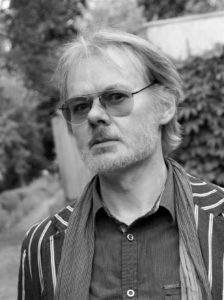Kęstutis Navakas

Photo by Eglė Adomulytė
The poet, translator and essayist Kęstutis Navakas (1964 ̶ 2020) was the aesthete of Lithuanian poetry, a dandy who didn’t believe in the boundary between life and art. He made his debut in 1988 with a collection of poems Krintantis turi sparnus (Wings On A Falling Man). Navakas grew up in Kaunas, which features in his work as his beloved city, and was heavily involved in the city’s cultural life. Alongside writing for the cultural press, at one point Navakas had a bookshop, which was one of the first private organisations in Kaunas to put on literary events. He also worked for television as a book reviewer, and translated a great deal of poetry from German and English.
His own writing is marked by a very playful attitude towards language. Yet Navakas’s playfulness is of a serious kind – it’s a doctrine of art and life: the game, just like art, dismisses every sort of pragmatism and therefore manages to escape the banality and gloom of everyday life. Navakas writing is elegant, erotic, and full of joie de vivre, with slightly decadent overtones. For him, no word has a single fixed meaning; he associates freely, even phonetically, and frequently uses quotes and references to spice up his writing. ‘I am an adventurer,’ he once said in an interview, which perfectly characterises both his personality and his work.
Navakas emerged as a mature visionary poet in his sixth and last collection of poems, net ne (Not Even, 2018) – playful and deep, serious, even tragic. His trademark imagery of a show or a feast is replaced by the situation of a subject who is dreaming in solitude or simply engaging in a game of memory and observing this game. Surreal, alogical elements are linked to the idea of diversity of the subject and the surrounding world – nothing is constant, everything is changing. Navakas plays with linguistic sounds and rhymes as well as punctuation, spacing, pauses, and definitions of genre. In the first chapter of the collection, Navakas revises the classic quatrain, while the second one features “surreal” sonnets.
Selected translations
English: The Sand Clock; From an Unknown Poets’s Diary; Sonnets. Translated by Jonas Zdanys. In: Six Lithuanian Poets. Todmodern: Arc Publications, 2008
Swedish: Jarnrida; De vandrande genom hosten; Sondagssnon; Tulpaner. Translated by Liana Ruokytė and Juris Kronbergs. In: Litauen diktar: mote i gryningen. Stockholm: Bokforlaget tranan, 2005
Translations on-line: www.lyrikline.org/en/authors/kestutis-navakas